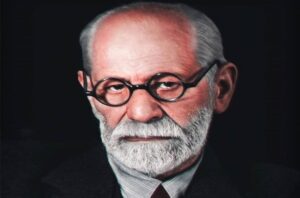
Unit 12
Sigmund Freud
新知思想/閱讀種子
New Knowledge/Reading Knowledge
BRAIN STORM
Share your ideas with your teacher and try to make sentences.
What do you think Sigmund Freud is known for?
VOCABULARY
Repeat these sentences after your teacher.
1. psychoanalysis (n.) 精神分析學,心理分析學
Freud created Psychoanalysis.
弗洛伊德創建了精神分析學。
2. pseudoscience (n.) 偽科學
Freud was also a believer of pseudoscience.
弗洛伊德也是偽科學的信奉者。
3. empirically (adv.) 實證地,以經驗或實驗為依據地
Your theory that has not yet been tested empirically.
您的理論尚未經過經驗檢驗。
4. id (adj.) (精神分析中的)本我
Id is one of the three divisions of the Psyche.
5. ego (n.) (精神分析中的)自我
Ego was also conceptualized by Freud.
自我也是弗洛伊德的概念。
6. superego (n.) (精神分析中的)超我
Your superego is partly conscious.
你的超我是有意識的。
7. transference (n.) (精神分析中的)轉移
Freud also invented the process of transference.
弗洛伊德還發明了轉移的過程。
Dialogue
Read the dialogue aloud with your teacher.

Sigmund Freud, the founder of psychoanalysis, might seem to some to be a strange addition to a list of great scientists.
After all, his investigation into the interaction of the conscious and unconscious has been called quackery and pseudoscience practically since the start.
Because the claims of psychoanalysis cannot be empirically tested or independently verified, critics cry that it can’t be scientific. Ergo it has no role in a therapist’s toolkit.
And yet he endures nearly a century after his death.
In his writings, Freud developed a tripartite model of human psychic structure, made up of the “id,” “ego ” and “superego.”
Dream interpretation and free association helped him to discover transference, where repressed feelings toward one person are redirected or transferred to another.
In the aftermath of his death, still shunned by science, Freudian analysis found refuge in the humanities, where it is still thriving today, especially in literary criticism.
Outside of academia, Freud’s impact on modern popular culture cannot be overstated, something to which anyone who has ever let out a “Freudian slip” can attest.
Grammar
ergo
Although Latin is an ancient language, it is still used by people all around the world. The word “ergo” in today’s lesson is an example.
“Ergo” is basically another way to say “therefore,” so you can use them interchangeably.
Or, another great way to use “ergo” is when you are presenting an argument with several parts. This doesn’t have to be a complex argument: Just one where you want to make sure someone can follow your logical path. For example: A, therefore B. B, ergo C.
1. You were present at the time of the robbery, ergo you were called as a witness.
2. It was difficult to find a star, ergo it was difficult to find funding for the movie.
3. She lived on campus, ergo her transportation budget was quite low.
4. ________________________________________________________________.
DISCUSSION
Make a conversation with your teacher.
1.Do you like Psychology? What terms and ideas have you heard, that is related with Psychology?


